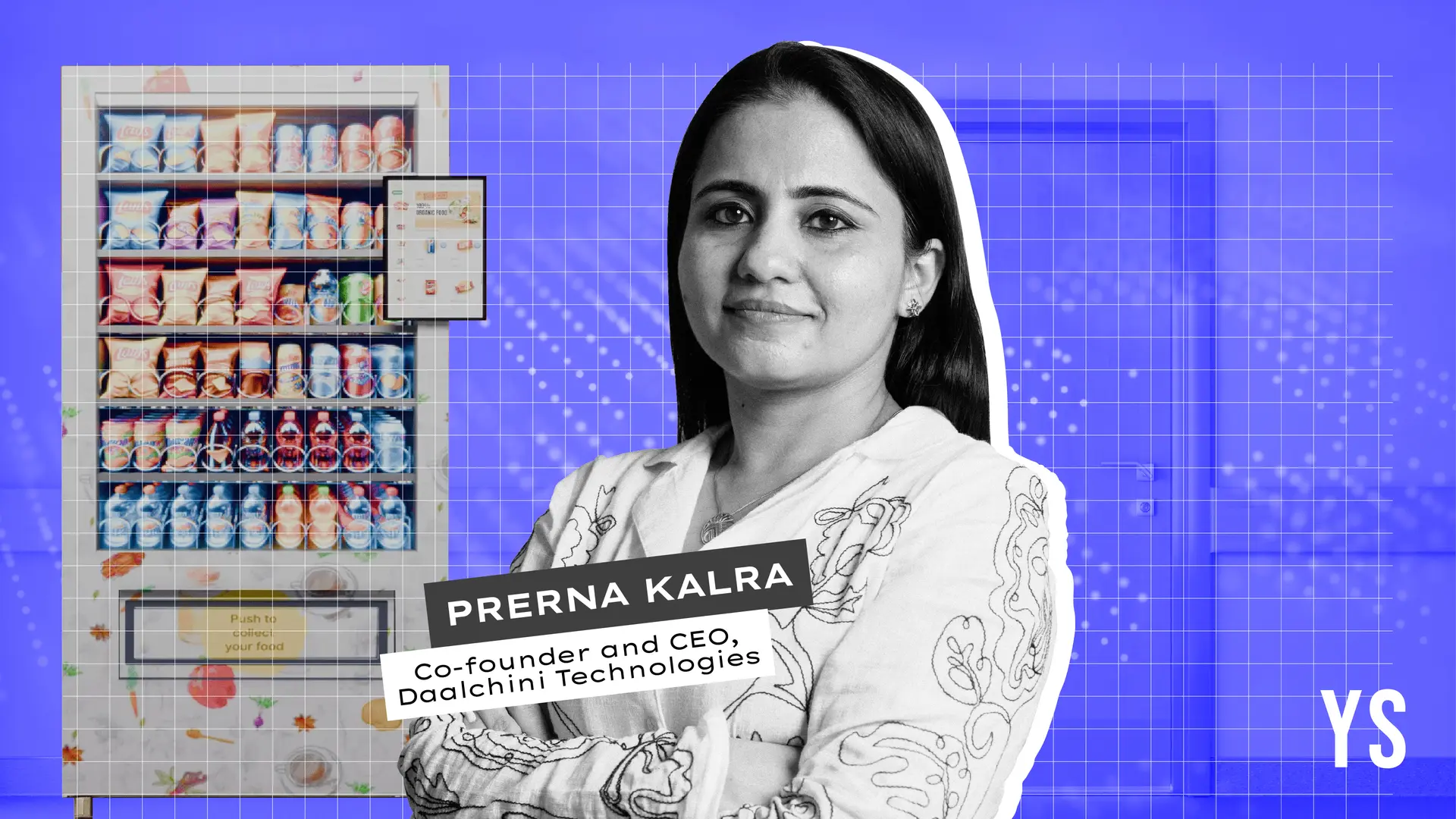After 3.5X revenue growth in 2 years, this vending machine startup is integrating AI in retail
Founded in 2018 by ex-Paytm executives Prerna Kalra and Vidya Bhushan, Daalchini Technologies is implementing data-driven solutions and AI models to offer products through automated retail and smart vending machines.
While vending machines are synonymous with the streets of Tokyo, India too is warming up to automated retail. Rapid urbanisation, digitisation, and higher retail investment are fuelling the growth of the vending machine market in India at a CAGR of 14.9% during 2020-2026 (6Wresearch) with 6 million possible vending locations.
A big push is coming from Daalchini Technologies, which, since its inception, has installed over 2,500 smart vending machines in more than 80 cities across the country. The full-stack retail tech startup has witnessed a 123% CAGR growth rate in the last eight quarters. Its number of retail outlets has grown more than 10X post-pandemic.
“We had less than 200 outlets pre-COVID-19. Now, we have more than 2,300 outlets across the country,” Prerna Kalra, Co-founder and CEO, Daalchini tells YourStory.
These outlets provide a wide range of products, including fresh snacks, beverages, beauty items, and essentials catering to on-the-go needs. Daalchini also offers wellness vending machines with products like sanitary napkins, wet wipes, mouth fresheners, toilet sprays, etc. It has also introduced vending machines for stationery and books, as well as for OTT products and industrial goods.
The Delhi-based startup strategically places vending machines in public places, including metro stations, high transit points, malls, IT parks, etc, to target busy commuters, working professionals, students, and residential communities.
Over the last three years, Daalchini’s topline has grown substantially. In FY22, the company earned Rs 12 crore in revenue, which grew to over Rs 25 crore in FY23 and Rs 42 crore in FY24. It expects to cross Rs 100 crore in annual recurring revenue by this fiscal year’s end.

Kalra mentions, “The primary drivers of this growth include the expansion of our footprint across 70+ cities, continuous product innovation based on customer feedback, and a robust operational strategy
leveraging real-time data insights.”
The company has been EBITDA-positive in its core food and beverage division since January this year, with a margin between 1-4%. “We had a slight loss in last financial year, but this entire financial year, we have been EBITDA positive,” she states.
Integrating AI in vending machines
Daalchini’s smart vending kiosks collect data on customer preferences, purchase patterns, and peak buying times, which enables the company to make data-backed decisions on product assortments, pricing, and replenishment.
“The data helps us optimise inventory, understand demand shifts, and adapt to seasonal trends, ensuring each vending point meets hyperlocal needs efficiently. Additionally, this data allows us to develop insights into the most popular items, improve stock availability, and ultimately, boost customer satisfaction and retention,” explains Kalra.
The company has hinged its growth strategy to AI-led retail to optimise the probability of selling the product within a small area. “The innovation we are doing around the retail tech solutions and the implementation of AI models in our solution has helped us to provide the right set of products in a six-square-foot area,” she explains.
It leverages technologies like the Internet of Things for remote monitoring and real-time restocking updates to ensure an uninterrupted supply.
“Our proprietary ordering and projection engine, OFT (Order for Tomorrow), is specifically designed to predict the ideal quantity of fresh meals to restock in each vending machine daily, significantly reducing food wastage. OFT is meticulously trained on historical sales data and customer consumption patterns,” she explains.
In addition, Daalchini’s consumer app utilises AI to analyse customer purchasing behaviour, search history, and past purchases.
“This enables us to recommend products that align with individual tastes and preferences,” adds Kalra.
What does it offer
Unlike traditional vending machines, Daalchini's outlets are cashless, app-based, and contactless.
“Our robust technology platform, which supports multiple payment methods including UPI, mobile wallets, and card payments, also sets us apart, making the entire vending experience seamless and hassle-free for users,” claims Kalra.
Around 80% of the startup’s vending machines offer six meal varieties, including early breakfast, mid-day snacking, midnight snacking, salads, and desserts. These are offered through partnerships with local businesses and direct-to-consumer (D2C) brands. The system also tracks food safety and uses machine learning to manage the supply chain.
Kalra explains, “Our system automatically deactivates any products approaching their expiration date, preventing customers from purchasing expired items.”
The startup also puts its vending machines under CCTV surveillance for sexurity.
Daalchini works with over 40 D2C brandsm including HUL, Amul, Britannia, Nestle, Marico, and ITC. They are currently serving 500 clients, including The Times of India, Paytm, NITI Aayog, Gaana, Fortis, Dell, MAX Hospitals, and EY.
Daalchini’s competitors include Vendiman, Nutritap, and Vendekin, but they differentiate
from other players in the market by focusing on the unique demands of the Indian market.
“Our vending solutions prioritise hyper-localisation, offering highly customisable product assortments tailored to each location’s demographics and preferences,” she notes. The company is targeting Tier II and III cities with a large working population, and has recently received orders from Kutch, Jharsuguda, and Sambalpur.
Most of these orders come from large manufacturing companies, plants, and offices for vending machines to be installed at their sites. Once installed, Daalchini either manages these machines directly or onboards franchise partners.
Business model and revenue strategies
Daalchini offers its vending machines via two models.
In the rental model, the company rents out vending machines to clients and manages all operational aspects, including daily refill, maintenance, supply, customer support and overall management. Second is the franchise model in which Daalchini sells the vending machine to the partner, who then assumes full responsibility for its operations.
“More than 95% of our vending machines are owned by our partners and we provide them with technology and supply chain for the same,” Kalra adds.
Daalchini’s major revenue comes from products sold through the vending machine, attributing 40% to the topline. “We earn through the margins on the products we sell, which range from 12% to 45%,” she says.
It also earns through brands advertising their products on Daalchini’s vending machine and placing them accordingly so that they sell better. “We collect a listing fee from brands to feature their products in our vending machines. This contributes 5% of the revenue,” she states.
Thirdly, it earns through subscription which contributes maximum towards its profit. “We charge a monthly rental fee for machines installed at locations such as offices, hotels, colleges, hospitals, factories, and more and this contributes to 40% of our revenue.”
Daalchini also earns through ads on its digital screens and mobile app. It also offers physical advertising spaces for brands, with overall advertising opportunities contributing 15% to the revenue.
Over the next 12-18 months, Daalchini plans to grow its network of smart retail outlets from 1,600 to over 5,000.
While there are no immediate funding plans, Daalchini has raised over Rs 55 crore so far. The last round was a $4 million Series A round in 2022 led by Unicorn India Ventures, with participation from existing investors like Artha Venture Fund, Ajay Kaul (former CEO of Domino’s India), and VSS Investco (investment arm of Vijay Shekhar Sharma, CEO of Paytm).
“We envision having our autonomous smart stores and vending machines in every 500 meters of livable space in India. Daalchini aims to become more accessible and prominent in the market by reaching out
to small towns and isolated places,” says Kalra.
Besides vending machines, the company is also exploring micro-market setups and fully automated kiosks to expand its retail footprint and broaden its range of products.
Edited by Kanishk Singh




